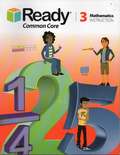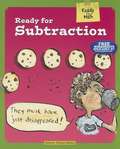- Table View
- List View
Ready Common Core, Mathematics Instruction [Grade] 2
by Curriculum Associates LlcNIMAC-sourced textbook
Ready Common Core, Mathematics Instruction [Grade] 3
by Curriculum AssociatesNIMAC-sourced textbook
Ready Common Core, Mathematics Instruction [Grade] 5
by Curriculum Associates LlcNIMAC-sourced textbook
Ready Common Core, Mathematics Instruction [Grade] 6
by Curriculum Associates LlcNIMAC-sourced textbook
Ready Common Core, Mathematics Instruction [Grade] K
by Curriculum Associates Llc.NIMAC-sourced textbook
Ready Common Core, Reading Instruction [Grade] 2
by Curriculum Associates LlcNIMAC-sourced textbook
Ready Common Core, Reading Instruction [Grade] 3
by Curriculum Associates LlcNIMAC-sourced textbook
Ready Common Core, Reading Instruction [Grade] 4
by Ron Larson Laurie BoswellNIMAC-sourced textbook
Ready Common Core, Reading Instruction [Grade] 5
by Curriculum Associates LlcNIMAC-sourced textbook
Ready Common Core: Mathematics Practice 3 (PARCC Edition)
by The Editors at the Curriculum AssociatesThis is a review program for the Common Core State Standards in Mathematics. This book has three practice tests. In each practice test, you will answer 40 to 49 questions in the key areas of Mathematics.
Ready Florida LAFS, English Language Arts Instruction Grade 3
by John Ham Anne Cullen Melissa Brown Rob Hill Susan James William KelleherNIMAC-sourced textbook
Ready Florida LAFS, English Language Arts Instruction Grade 4
by John Ham Anne Cullen Melissa Brown Rob Hill Susan JamesNIMAC-sourced textbook
Ready For Subtraction
by Rebecca Wingard-Nelson Tom LaBaffMath is used everywhere, and it is an important part of your life. You use math when you are playing games, cooking food, spending money, telling time, reading music, and doing any other activity that involves numbers. Even finding a television station uses math!
Ready Georgia, Reading Instruction [Grade] 5
by John Ham Anne Cullen Melissa Brown Rob Hill Susan James William Kelleher Ruth RothsteinNIMAC-sourced textbook
Ready Indiana Mathematics, Practice and Problem Solving, Grade 2
by Curriculum Associates Llc.NIMAC-sourced textbook
Ready Indiana Mathematics, Practice and Problem Solving, Grade 4
by Curriculum AssociatesNIMAC-sourced textbook



